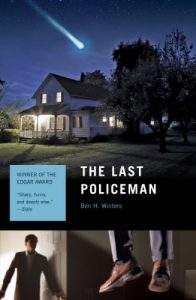 This year, the excellent people who organise the annual Bute Noir crime writing festival set a reading challenge for anyone who wants to join in: 30 crime books, 30 different categories. How many can you complete and which are your favourites? I’ve decided to give it a go, just for fun, and because I’m hoping it’ll lead me into areas of crime writing I’ve not explored before, or not explored for some time. I’m blogging some of my findings here as I go along. I’m also intending to write up the experience as a whole towards the end of the year.
This year, the excellent people who organise the annual Bute Noir crime writing festival set a reading challenge for anyone who wants to join in: 30 crime books, 30 different categories. How many can you complete and which are your favourites? I’ve decided to give it a go, just for fun, and because I’m hoping it’ll lead me into areas of crime writing I’ve not explored before, or not explored for some time. I’m blogging some of my findings here as I go along. I’m also intending to write up the experience as a whole towards the end of the year.
The experiment is proving incredibly enjoyable and worthwhile so far. The category I’ve tackled most recently has been that of crime novel set in the future. I chose to read Ben H. Winters’s The Last Policeman firstly because I happened to have it already on my Kindle (it was going really cheap at one point, so I snapped it up) and secondly because I needed an antidote to the recent (bloody awful) BBC future-crime series Hard Sun, and a friend happened to mention that The Last Policeman utilised some of the same ideas but much better.
The novel takes place in the very near future, An asteroid is on a certain collision course with Earth. It will bring about a worldwide environmental catastrophe of extinction-level proportions. Society hovers on the brink of collapse. With basic infrastructure beginning to crumble, and a wave of suicides reaching epidemic proportions, the police have begun to turn their attention away from solving crimes and towards the more urgent business of enforcing order. In the city of Concord, New Hampshire, police patrolman Henry Palace has just realised the dream of a lifetime: he’s been made detective, early, and he intends to live that dream, asteroid or no asteroid. When the police are called to investigate a death at a local McDonald’s, Hank’s fellow officers are inclined to dismiss it as yet another ‘hanger’. Hank is not so sure. He believes Paul Zell has been murdered, and is determined to prove it.
This book surprised me in all sorts of ways, most of all in Winters’s skilled and original use of science fiction. If I was expecting anything at all, it was a rather clumsy, Armageddon-like action thriller. Instead, I was given a subtle, claustrophobic, believable pre-apocalypse that swapped deliberately ramped-up tension for genuine emotion, a slowly accumulating, all-pervasive dread that infects the reader’s system as the novel progresses. It infected this reader’s system, anyway – maybe it’s just Brexit.
But the true success of Winters’s approach lies in his ability to keep his science fiction at one remove. Palace’s obsessive temperament, his tendency towards isolation, his dogged sense of morality ensure that it is the murder investigation, and not the asteroid strike, that dominates the narrative. What we get is a detailed – detailed to a level that only Hank could provide – account of a crime in progress, a portrait of a town that Henry knows like the back of his hand. That Henry and the murdered man seem so alike is another piece of weirdness – and also fortunate in that it allows Henry privileged access to the mind of the victim. The plot is deftly worked and – unlike so many generic thriller plots – it does not degenerate into senseless melodrama towards the end.
The Last Policeman is a beautifully executed, intellectually satisfying police procedural. It is a novel of craft and assurance, in which a close-focus, personal account is played off against a world-changing political story arc to devastating effect. The writing – like the story itself – is understated and powerfully resonant. As science fiction. Winters’s novel worked better for me than anything I read for last year’s Sharke. As crime fiction, it is equally bold, introducing us to a detective we admire for his persistence rather than his brilliance. We understand his turn of mind – or maybe that’s just me…
In either case, I’ll definitely be reading the rest of the trilogy. The Last Policeman is a treat, albeit a bitter one. Recommended.